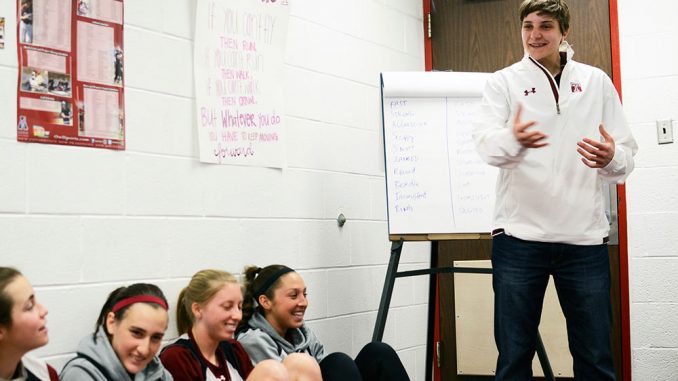
Kat Longshore remembers reading a particular Sports Illustrated article in seventh grade.
She played baseball and softball growing up, and knew that she needed to do something in sports. In the story, the words “sports psychologist” caught her eye.
“I went ‘sports psychologist? What’s that?’” Longshore, the lacrosse team’s mental conditioner, said. “Because I was also the friend that everybody came and talked to and would give advice and talk through problems and that sort of thing so psychology always interested me as well. I was like, ‘Huh, if there’s a way I could fuse though two things together.’”
By the time she figured it out, she was already looking to get a jumpstart. When Longshore began high school, she went looking for chances to coach and try and hone the mental aspect of sports.
She went to Lafayette for an undergraduate in psychology and played softball along the way. Then, after graduating in 2007, she spent the next four years in England to earn a master’s degree in sports psychology. It was something she never would have imagined back in the seventh grade.
“Even up until junior year of college, I wouldn’t have guessed that would be where I ended up,” Longshore said.
But after completing a six-week internship that allowed her to work with someone in her field, she said she fell in love with the United Kingdom and wanted an excuse to go back.
A master’s degree gave her just that. Another reason she returned was the British Association of Sport and Exercise Sciences (BASES), which provides accreditation for sports psychologists. Through that, she had the opportunity to work with different teams and athletes, including Great Britain Softball and England Women’s Lacrosse.
“That’s kind of where I got my start in lacrosse and the mental side of the game,” Longshore said.
It wouldn’t be her last encounter with the sport either, as she would go on to take a mental condition role with Temple’s lacrosse team. Longshore returned to the states in 2012, and got accepted into Temple’s PhD program. Now into her second year in the program, Longshore is happy that there are opportunities to work with teams – even in a research-heavy program.
“I wanted to keep my skills up in the consulting side of things,” Longshore said. “[Coach Bonnie Rosen] talked to one of my professors about sports psychology things and they knew that I worked with England Lacrosse.”
Rosen first heard of Longshore after taking part in a study on coaches and wanted her to meet with the team. Rosen always wanted to have someone help out with mental conditioning since taking over at Temple, but couldn’t until this year.
“We just haven’t had the resources up to this point.” Rosen said. “To have someone who can educate our team and provide them the skills, and then more specifically with individual players, to our team is a tremendous asset.”
Longshore got in touch and began working with the team in the fall. Lacrosse was the second team she worked with since coming to Temple, after working with softball the year before.
“It’s been fantastic,” Longshore said. “Bonnie is extremely open to sports psychology, which makes it a nice environment to work in,” Longshore said. She allows me whatever access I want to have.”
From practices, to meetings and time with individual athletes – Longshore has been working with the team at least once a week.
“There are a lot of opportunities to see the team in a lot of different arenas,” Longshore said. “That really allows me to understand what are some of the things that from a mental side, the team maybe is really good at and needs to be reinforced, but also some of the challenges that they have that I could maybe helpful in, helping them see ways to overcome those challenges.”
The team has welcomed the help.
“In the beginning it was a little slow coming,” graduate defender Nina Falcone said. “It was like, ‘Oh, we’re going to have a mental conditioning coach.’ And we didn’t know how to feel about it. But as time went on, you could tell we’ve gotten a lot closer to her. We feel comfortable saying things and I think that has opened us up a lot to each other and to her. It’s definitely brought us closer together as a whole.”
“Now I think we’re just more aware of the mental side of the game,” senior midfielder Lea Britton said. “It plays a huge role. It’s critical to staying focused and winning big games. A team can be great, but to take it to another level and be consistent you need the mental side too.”
Nick Tricome can be reached at nick.tricome@temple.edu or on Twitter @itssnick215.



Be the first to comment